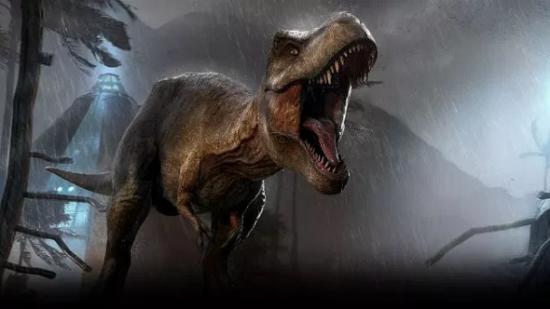Bringing authenticity to a Jurassic Park videogame is a complicated business.
Michael Crichton’s original 1990 book – and the subsequent films – used real science as a foundation, but they weren’t afraid to stray from fact if it meant stirring something in their audiences. Tyrannosaurus Rexes only seeing you if you moved? That’s only the case in Jurassic Park, alas.
Now, 25 years after the initial cinema release, UK studio Frontier is poised to release Jurassic World Evolution, a management simulation game based on Crichton’s beloved dinosaurs. As such, the development team have had their own balancing of fact and fiction to do.
Need to keep it real? Check out the best simulation games on PC.
There is respect to Crichton’s source material to consider, and equally there is science’s current understanding of dinosaurs; one that has changed a good deal since Dr. Alan Grant set off for Isla Nublar. For one, in recent years, it’s become accepted that dinosaurs were likely much more brightly coloured than previously assumed. And many of them may well have been covered in feathers.
“Don’t mention feathers to Jonny,” the jovial game director of Jurassic World Evolution, Michael Brookes, says as he gives his colleague a playful nudge. He is referring to Jonny Watts, chief creative officer at Frontier, and, as it happens, a former student of zoology with a deep passion for biodiversity, and animals past and present. Watts is visibly excited to get talking about the nuances of humanity’s understanding of dinosaurs.
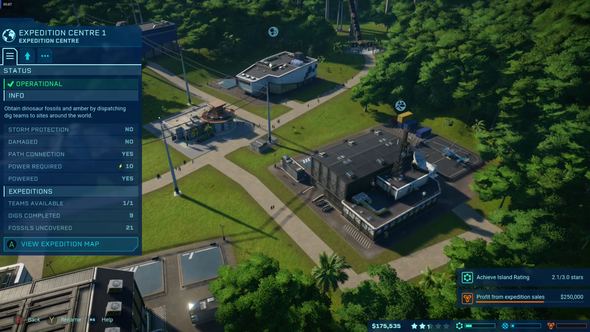
“Steady on with this talk of feathers,” Watts warns mischievously. “Seriously, though; we’re guided by the science of Jurassic Park. We’re following the precedents set in the film world. We’ve pursued accuracy, of course – my zoology studies have certainly made me care about that.
“Last year we had an expert named Dr. Jack Horner help us. He was consultant paleontologist on the [original] Jurassic Park films. He essentially said that what he knew then is not the same as what he knows now. He told us about what dinosaurs looked like by today’s understanding, but guided us with what they understood back in the day.”
The result is a game that feels every part zoologically authentic, but that favours the spirit of Dr. Horner; a man who believes Tyrannosaurus Rex to be a scavenger, but that helped shape a film that made them history’s most infamous predator.
The game itself is – on paper – a Jurassic World title, but it feels much more like an homage to the entire series. And, unsurprisingly, it draws on Frontier’s considerable experience with the genre: most notably Planet Coaster and Zoo Tycoon.
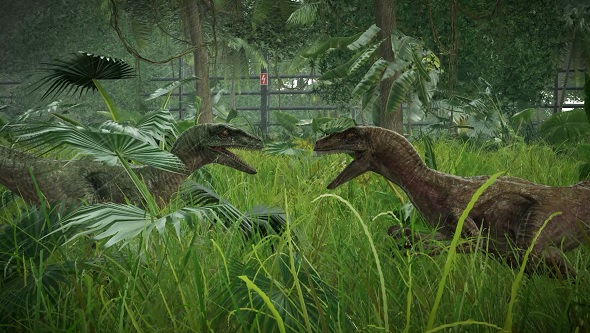
As management games go, at a glance, Jurassic World Evolution is fairly conventional. You must build a profitable tourist attraction and manage the inevitable crises that come about when you mix towering carnivorous dinosaurs and swathes of sightseers. Deep in the heart of the gameplay is a simple yet powerful risk/reward mechanism. The most dangerous dinosaurs draw the largest crowds, but are much harder to contain.
Beyond that, Jurassic World Evolution offers a rather nuanced, elaborate distraction. You’ll be tasked with designing enclosures that keep carnivores and herbivores apart, while providing their inhabitants with everything needed to live, and giving visitors generous views. In freshly built labs genes must be toyed with and fossils prodded so as to breed and tailor showpiece beasts. Equally, plenty of care needs to be given to these special dinos once they are released into your park.
Land must be terraformed, paths laid, and networks of power lines plotted to keep everything running. Hotels, gift shops, restaurants, and entertainment need providing, as do all the facilities required to maintain a park, care for dinosaurs, and take control when guests become prey. Storms will hammer your facilities, beasts will grow old and die, and myriad other events will keep you from complacency.
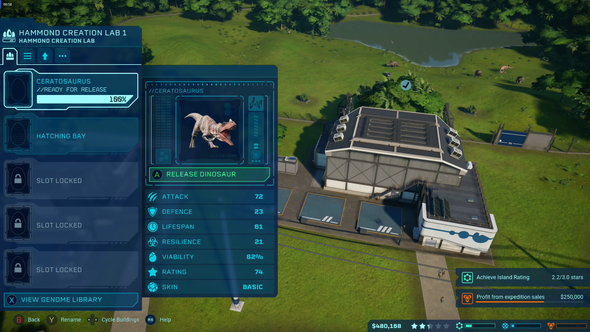
Really, though, when we think of Jurassic Park, few leap to pondering the ecosystems of tourist attractions. Hiding in stainless steel kitchens; dinosaurs peering into gaudy Jeeps; men eaten whole from toilets: these are the scenes that trigger a flurry of John Williams’ celebrated score to start playing in your mind. So why build a management game to capture what Jurassic Park is?
“When I watch a film like Jurassic Park I wonder ‘what would I do in that situation?’,” Watts says. “Well, with a management game you can answer that question. How would you make your park exciting and safe? What would you do when it all goes wrong?
“And narrative is really important to what we’ve made,” Brookes adds. “Even though it is a management game, we worked hard to make sure there was a strong narrative running through it too. It kind of merges the ideas of decisions having consequences, and individuals finding their own personal stories.”
That narrative is largely guided by some solid, evocative voiceover work, including a bounty from Jeff Goldblum, who reprises his role from the first two films as Ian Malcolm. While Goldblum serves as your somewhat sarcastic mentor, other characters will try and influence the park you build. There is the scientist who pushes you to pursue genetic purity, an excitable marketer with a devout belief in entertaining guests, and a security officer who can’t stop musing on the weaponisation of dinosaurs. Each will battle for your attention, offering sometimes contradictory mission goals that force you to make moral and personal decisions.
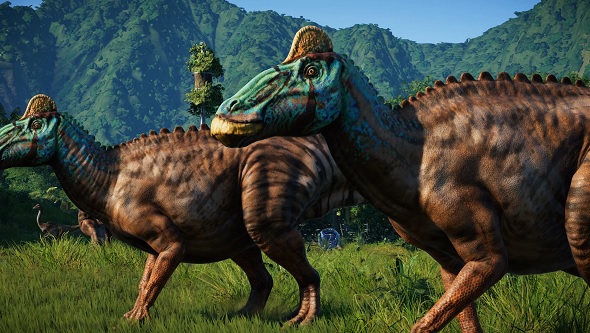
Ultimately, you must develop prosperous sites on five islands, each of which provides a new capacity for expansion, more to do in terms of minute-by-minute maintenance, and greater challenge.
As such, Jurassic World Evolution sits in something of a void for its genre. While many classic series of this ilk have been diluted down for free-to-play mobile gaming, others have kicked back against ‘casualisation’ and become entrenched in their own hardcore credentials. Sat between those two opposites, Jurassic World Evolution comes as a welcome return to the complexity of the 1990s era of management titles. It is deep, multifaceted, and elaborate, but not so much so that it is inaccessible. Thanks to some careful plotting of early missions, in an hour or so you’ll feel like you’re ruling over a game that should take weeks to learn.
The result is an experience that is absolutely captivating, consistent, and considered. A management title has triumphed when your in-game to-do list keeps you teetering on the fine line that separates control and chaos. When the likes of SimCity, The Settlers, and Populous were at their best, they were impossible to put down because there was always just one more – or maybe ten more – things to do.
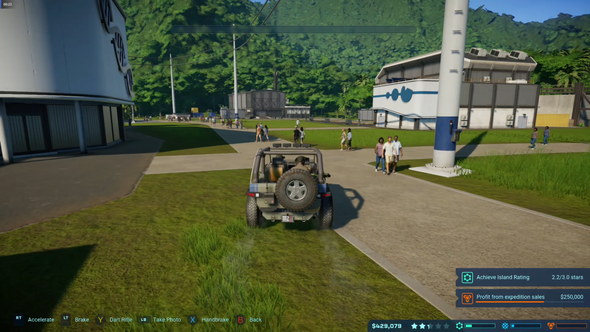
That’s where Jurassic World Evolution succeeds. It also has an admirable capacity for emergent gameplay; something cemented in the inevitable moment you realise you can use terraforming to shape jumps to grant vehicles quick access to enclosures. The design team won’t ask you to do that but they’re happy you did.
Despite so many encouraging signs, Jurassic World Evolution’s making will be in its longevity. How much captivating content is in the five-island campaign – and how much reason to keep playing there will be with that complete – is yet to be seen. After a handful of hours with it the game feels impressive, but a management game needs to fill plenty more time than that.
And while you won’t find any feathers in-game, Frontier did embrace the newfound colourfulness of dinosaurs to introduce a little variety to the specimens on offer. Watts can live with that.
